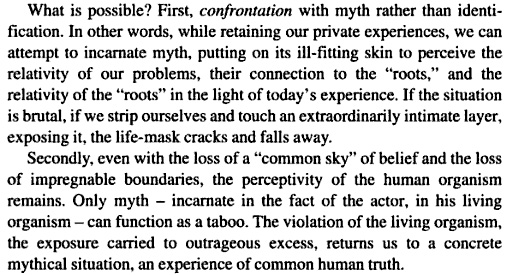If you are in the theatre — and if you are not aware of the germinal revolution Jerzy Grotowski had against Theatre of the Status Quo — then you need to dig into his oeuvre to discover how this “painter of the mind” reconstructed the dramatic human experience through direct touch and consequential dramatic danger.

Here is the first paragraph of Grotowski’s Statement of Principles:
The rhythm of life in modern civilization is characterized by pace, tension, a feeling of doom, the wish to hide our personal motives and the assumption of a variety of roles and masks in life (different ones with our family, at work, amongst friends or in community life, etc.-). We like to be “scientific,” by which we mean discursive and cerebral, since this attitude is dictated by the course of civilization. But we also want to pay tribute to our biological selves, to what we might call physiological pleasures. We do not want to be restricted in this sphere. Therefore we play a double game of intellect and instinct, thought and emotion; we try to divide ourselves artificially into body and soul. When we try to liberate ourselves from it all we start to shout and stamp, we convulse to the rhythm of music. In our search for liberation we reach biological chaos. We suffer most from a lack of totality, throwing ourselves away, squandering ourselves.
In Peter Brook’s book, “The Empty Space” — the Bible for Modern Theatre — he devotes a section to his discovery of Grotowski:
In Poland there is a small company lead by a visionary, Jerzy Grotowski, that also has a sacred aim. The theatre, he believes, cannot be an end in itself; like dancing or music in certain dervish orders, the theatre is a vehicle, a means for self-study, a means for self-study, self-exploration, a possibility of salvation. The actor has himself as his field of work. …
Seen this way, acting is a life’s work – the actor is step-by-step extending his knowledge of himself through the painful, ever-changing circumstances of rehearsal and the tremendous punctuation points of performance. In Grotowski’s terminology, the actor allows a role to ‘penetrate’ him; at first he is all obstacle to it, but by constant work he acquires technical mastery over his physical and psychic means by which he can allow the barriers to drop. ‘Auto-penetration’ by the role is related to exposure: the actor does not hesitate to show himself exactly as he is, for he realizes that the secret of the role demands his opening himself up, disclosing his own secrets. So that the act of performance is an act of sacrifice, of sacrificing what most men prefer to hide – this sacrifice is his gift to the spectator….
Grotowski makes poverty an ideal; his actors have given up everything except their own bodies; they have the human instrument and limitless time – no wonder they feel the richest theatre in the world.
In the terrific book — The Grotowski Workbook — Jerzy himself writes this about his aesthetic want of the world and the actor’s necessary drive:

Here’s the translation, for the record, of that direct quote from page to eternal text:
What is possible? First, confrontation with myth rather than identification. In other words, while retaining our private experiences, we can attempt to incarnate myth, putting on its ill-fitting skin to perceive the relativity of our problems, their connection to the “roots,” and the relativity of the “roots” in the light of today’s experience. If the situation is brutal, if we strip ourselves and touch an extraordinarily intimate layer, exposing it, the life-mask cracks and falls away.
Secondly, even with the loss of a “common sky” of belief and the loss of impregnable boundaries, the perceptivity of the human organism remains. Only myth — incarnate in the fact of the actor, in his living organism — can function as a taboo. The violation of the living organism, the exposure carried to outrageous excess, returns us to a concrete mythical situation, an experience of common human truth.
Enough text talk!
Let’s let Jerzy prove his genius in person. Be sure you have translations turned on for YouTube:
Here is Grotowski at Odin Teatret in 1971:
You can see how Grotowski’s aesthetic becomes embedded in the actor’s practice:
To find an appreciation of Jerzy Grotowski — and to then let his influence imbue you with a non-mystical magic of a communicative dyad between the human stage and audience artifice — is to finally recognize the human effort in understanding the self that too often goes ignored and unnoticed in the name of mainstream entertainment.
That’s fantastic, David. He writes and speaks so well!
He was an amazing mind, Gordon. Grotowski was, in many ways, the last of the great lionic thinkers from the radical ’60s to leave his mark on the modern theatre movement with the actor at the center of the process.